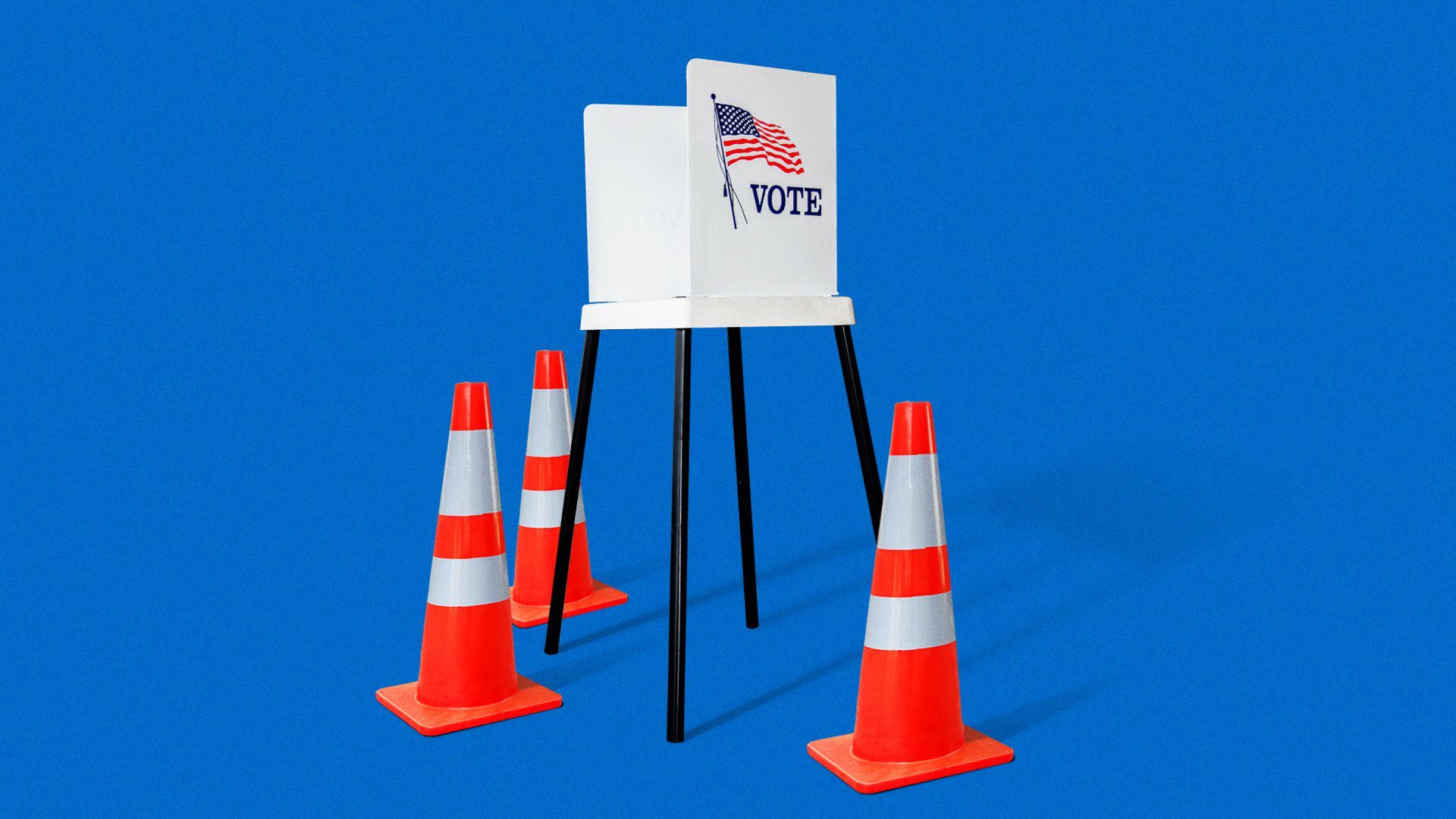Coons, Warnock discuss urgent need for voting rights
Add Axios as your preferred source to
see more of our stories on Google.

Illustration: Maura Losch/Axios
On the somber sidelines of former Sen. Johnny Isakson's funeral in Georgia last week, Sens. Chris Coons (D-Del.) and Raphael Warnock (D-Ga.) discussed a piece of urgent business: the importance of passing election reforms.
Why it matters: The exchange underscores the existential stakes not only the Democratic Party but some of its individual leaders attach to voting rights legislation. The setting was appropriate, given Georgia Republicans have enacted a series of changes that could impact the election efforts of Warnock and other key Democratic candidates.
- President Biden will weigh in Tuesday, when he flies to Georgia to publicly make the case for passing the Freedom to Vote Act — legislation pushed by Sen. Joe Manchin (D-W.Va.).
- His visit comes as the White House is growing increasingly desperate to find a path forward on the sweeping federal legislation.
- The White House and Democratic congressional leaders view it as a bulwark against election law changes already made at the state and local levels by Republicans and their political allies.
What we're hearing: Biden — who served in the Senate for 36 years — will go further than he has yet in calling on Democrats to bypass the Senate filibuster.
- Sources familiar with his speech tell Axios he'll echo many of the points he made last week in his address making the anniversary of the Jan. 6 insurrection as justification.
- He spoke about the importance of protecting the integrity of U.S. elections and blocking Republican voter suppression efforts nationwide.
- This week's remarks will be designed to be a national call to action, an administration official said.
- The White House did not respond to a request for comment.
Behind the scenes: Marc Elias, a top Democratic election law specialist, met virtually with the Senate Democratic caucus during their weekly lunch last week, two sources familiar with the meeting tell Axios.
- Elias told them that, at some point, the voter suppression laws being pushed in GOP states like Texas, Florida, Georgia and Arkansas will have become so targeted and disadvantageous that elections themselves moving forward will become more and more difficult, one source said.
- "It was chilling," the source said. "I mean, he was describing the laws that are being taken up in state after state, and they're really, they're concerning."
- Elias declined comment to Axios.
The big picture: The challenge for Democrats is the path forward.
- Manchin and Sen. Kyrsten Sinema (D-Ariz.) — despite supporting the legislation — refuse to drop their opposition to lowering the 60-vote threshold needed to pass major legislation or agree to create a one-time carve-out to bypass the filibuster.
Driving the news: Warnock "is gravely concerned that the people who stood up, who stood in long lines, who came out and voted and were heard in the last Georgia election ... will still be able to be heard in the next election," Coons recounted to Axios during an interview.
- The senator emphasized that, regardless of Warnock's re-election fight, "he sees this much more as a moral issue than as a political issue," and one the late Rep. John Lewis (D-Ga.) impressed upon him.
- "John Lewis was a member of his congregation," Coons said. "One of the two bills that we are most frequently talking about is the John Lewis Voting Rights Act."
The big picture: Democrats view passing a federal elections package as among — if not the — most important factor determining whether Democrats can keep winning elections in an environment increasingly structured to favor Republicans.
- “Protecting voting rights is a critical issue," said Lucas Acosta, senior spokesman for the Democratic National Committee.
- "While Republican lawmakers across the country have tried to erode our election systems and undermine our democracy, Democrats are going to fight back to hold them accountable and ensure that we protect the vote in 2022, and beyond."
